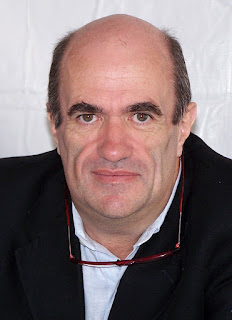Colm Tóibín Visits A.C.T.
By Simon Hodgson
 |
| Colm Tóibín. Photo by Larry D. Moore. |
In the week that Brooklyn,
the movie based on Colm Tóibín’s celebrated novel, was
nominated for three Academy Awards, the writer returned to A.C.T. to work on
his new play, commissioned by A.C.T. and based on Henry James’s The Aspern Papers. The Irish novelist,
critic, poet, and playwright is familiar with the rehearsal rooms high above
Grant Avenue. In 2014, his Tony Award–nominated play, Testament, was directed by A.C.T. Artistic Director Carey Perloff
at The Geary.
In a conversation with our M.F.A. Program actors hosted by Perloff,
Tóibín talked about aspects of his work of particular
interest to acting students: character development, storytelling in film, and the
challenges of form and structure as he works to adapt Henry James’s prose into
a play. The last topic in particular is an area A.C.T. is deeply involved in,
with the recent adaptation of Monstress
and the world premiere of A Thousand Splendid
Suns next season.
When asked about the way he develops
characters in his novels, Tóibín broke down his process. “All the novels
I’ve written have only one character,” he said, explaining that although there
may be many people in his stories, there is only ever one protagonist. “Everything
is rendered, seen, and felt by one person. The result is that, after 30 pages, the
reader becomes that person.”
Tóibín said he aims to embed the reader
in their own visualization, rather than investing time in descriptions of what
the characters look like. “What you’re trying to do is walk with the
reader’s imagination.” As a side note, that’s also the reason why his book
covers never feature images of faces, although he says that was a challenge
with his latest novel, Nora Webster
(2014). After his publishers sent him dozens of potential cover photos, they
reached a compromise: there was
a woman depicted on the cover, but she was shown from the back.
In addition to discussing his novel-writing process, Tóibín
told a few stories to the M.F.A. actors about what he’d learned adapting his
own work for the stage. By the time Testament
played at The Geary in 2014, he had already experienced the test of winnowing the novella’s 24,000
words down to 8,000 for the stage play. How did he feel, one A.C.T. actor
asked, truncating his work so dramatically? Tóibín paused and
smiled. “A good director or dramaturg will watch you and guide you and then
let you kill your darlings yourself.”
After seeing Testament
adapted for productions in Dublin and New York, he is philosophical about giving
up control. For new productions of the play, “everyone producing the show receives
the script from the Dublin production, the script from the Broadway production,
and the novel. Then I say, ‘Do what you want with it.’”
Tóibín has broadened his skill set to
screen as well as stage, and he shared some insights from
his work in film. In 2013, he said, he agreed to collaborate with German
director Volker Schlöndorff on a new project. Tóibín was excited. Schlöndorff
may be Europe’s most experienced director, having worked with a roll call of
talent from both sides of the Atlantic: Louis Malle, Arthur Miller, Jean-Pierre
Melville, Sam Shepard, Rainer Werner Fassbinder, Faye Dunaway, to name a few.
When the German filmmaker and the Irish writer finally sat
down to talk about the film script, Tóibín was full of questions. But to
every question, Schlöndorff would murmur, or sigh, or rub his
chin. Initially, Tóibín said, he was frustrated. Here
was this legendary film icon, and he didn’t have any of the answers. In time,
however, he realized that this was Schlöndorff’s process. “All the time,
he was filled with uncertainty,” said Tóibín. “He
was building from not knowing.”
As Tóibín sat amid the circle of
young actors eager to work across stage and screen, he was articulate about
the differences in writing for each medium. He spoke to the collaborative
nature of filmmaking (even in the writing stage), contrasting it with the process
of writing a novel, which he described as having “full autonomy, a
feeling of power.” Asked why he had chosen British novelist and screenwriter
Nick Hornby (High Fidelity) to adapt Brooklyn for the screen rather than
taking on the adaptation himself, Tóibín was characteristically
modest. “Because he knows something I don’t.”

